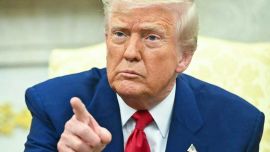Argentina changed its local vaccine regulations to speed access to a wider range of vaccines including those made by Pfizer-BioNTech, Moderna Inc and Johnson & Johnson, as the Joe Biden administration steps up donations.
President Alberto Fernández signed a presidential decree late Friday aimed at smoothing over certain legal and technical terminology, to find a middle ground between labs’ needs and government interests, according to official agency Télam. The decree, published on Saturday, will allow the purchase of paediatric vaccines and pave the way for the country to receive donations, authorities said in a previous announcement.
Signs of progress in the negotiations come at a dire moment for Argentina, which is edging closer to 100,000 deaths and ranks among the top 15 worldwide in deaths per million. Unable to broker agreements with US vaccine manufacturers, the government has relied on a mix of Russia’s Sputnik V jab, China’s Sinopharm shot and AstraZeneca Plc’s dose while supply shortages have crimped its inoculation campaign.
“Argentina will be able to acquire paediatric vaccines and broaden the spectrum of vaccines for the greater population,” said Legal & Technical Secretary Vilma Ibarra at a press conference, before Fernández signed the decree. Several labs had said existing legislation made it “impossible” to reach agreements, she added.
As part of the decree, the government will also create a Covid reparation fund to respond to any demands for indemnity by people able to prove they were damaged by a Covid vaccine, Ibarra added.
The government, which will face congressional elections later this year, has kept strict lockdown measures in place as cases and deaths mount, most recently limiting the entry of travellers from international flights to just 600 people per day. President Alberto Fernández has prioritised getting citizens their first dose over ensuring they are fully vaccinated. About 38 percent of Argentines have received one dose, while only nine percent have two doses, according to Bloomberg’s vaccine tracker.
The United States has stepped up vaccine donations in Latin America this week and announced it would donate to Argentina, too. Brazil, Colombia, Peru and Ecuador have received US donations of either Johnson & Johnson or Pfizer.
The government is also in talks with the World Bank to receive financial support for the purchase of more vaccines. Earlier this week, representatives from the multilateral lender and Moderna met with government officials to discuss legal contracts for the possible supply of its vaccine.
Neither the Moderna nor the Johnson & Johnson vaccines are yet approved in Argentina for emergency use.
Fernández’s Cabinet chief said Thursday evening that the government was evaluating whether they could resolve technical issues that have prevented deals with labs including Pfizer Inc.
Some labs “require different regulations and because of that, the president is looking at how to resolve it in a different way and advance with those contracts,” Cabinet Chief Santiago Cafiero said in an interview with local TV.
Fernández’s government has been at odds with Pfizer for several months over an indemnity clause in a law the government passed last year. Leaders of Argentina’s opposition party have heaped criticism on the Fernandez administration for not striking a deal with US producers before the country’s worst wave of Covid cases arrived in April.
The existing legal framework to purchase vaccines was approved at an early stage in the pandemic, and the lessons of the past few months give the government “the authority to now weigh whether the current framework needs to be modified,” Cafiero said in the Thursday interview. “The president will make the decision with the need for more vaccines at the top of his mind.”
related news
by Patrick Gillespie & Jorgelina do Rosario, Bloomberg






















Comments